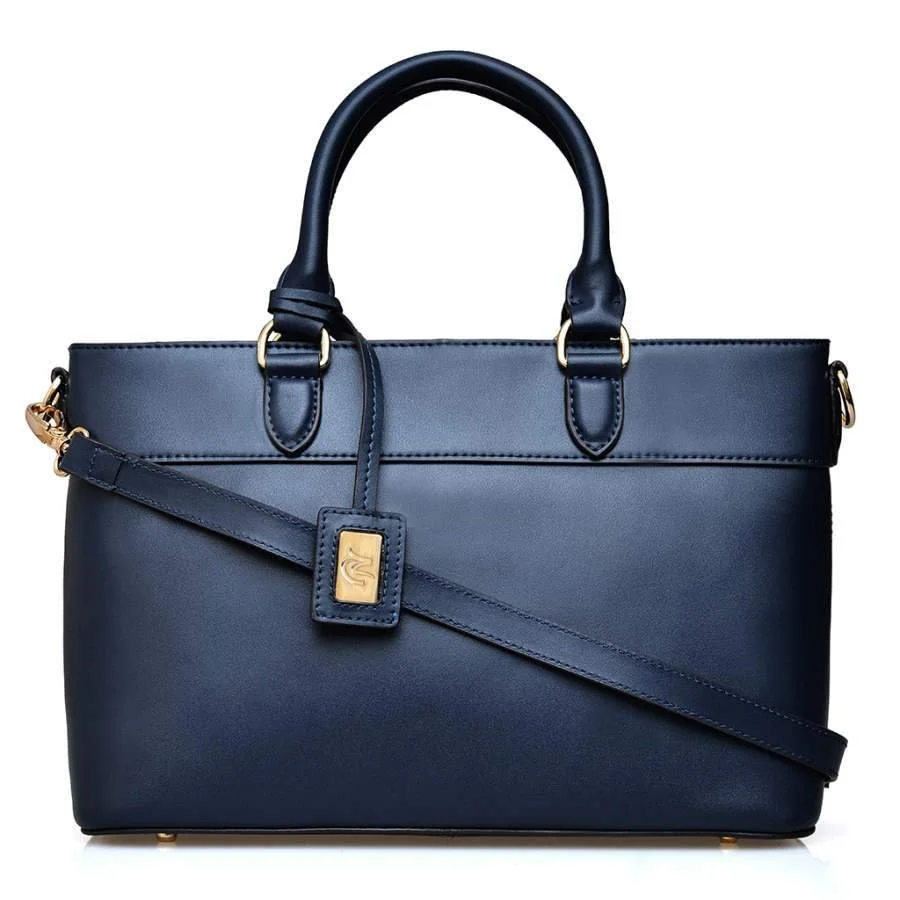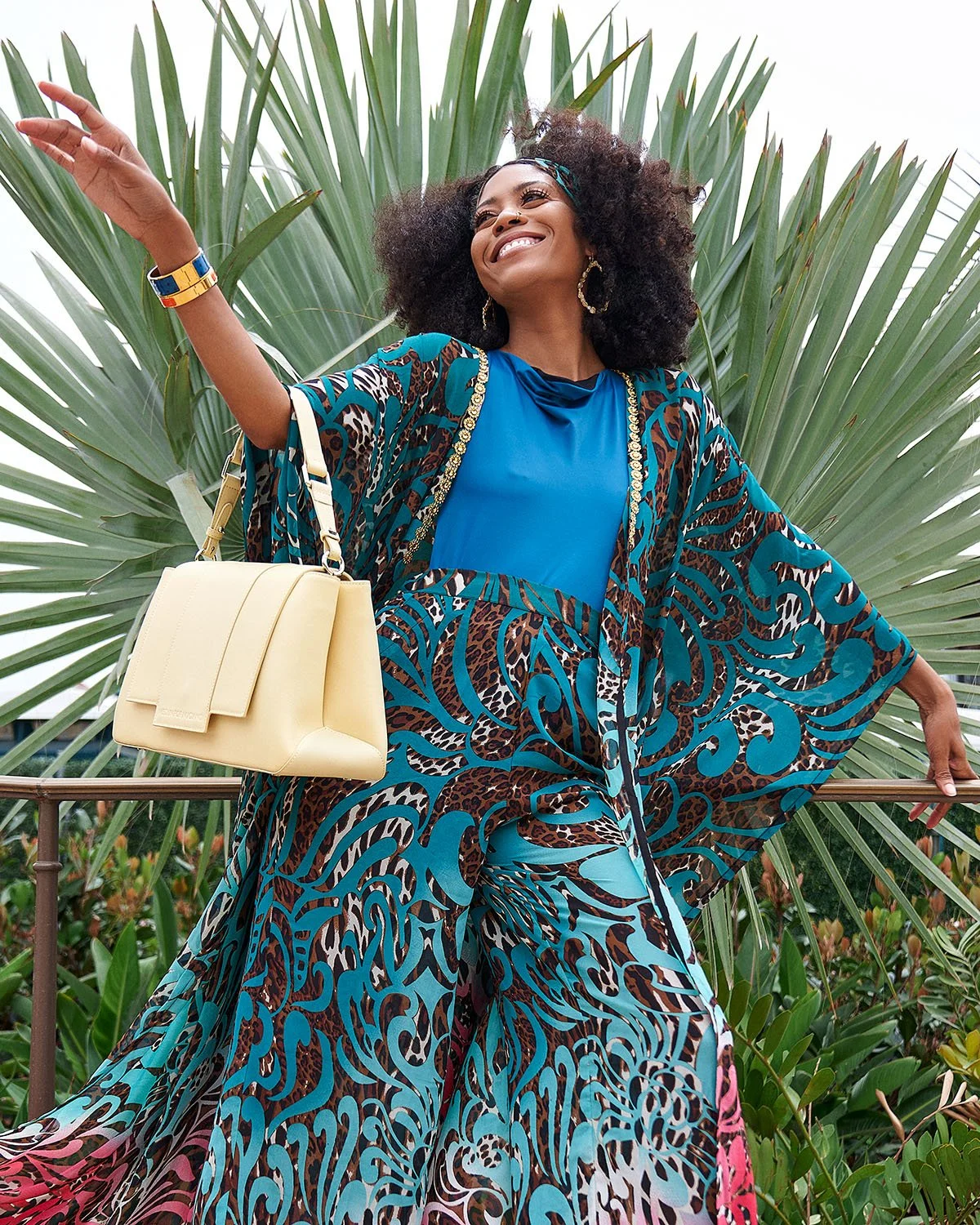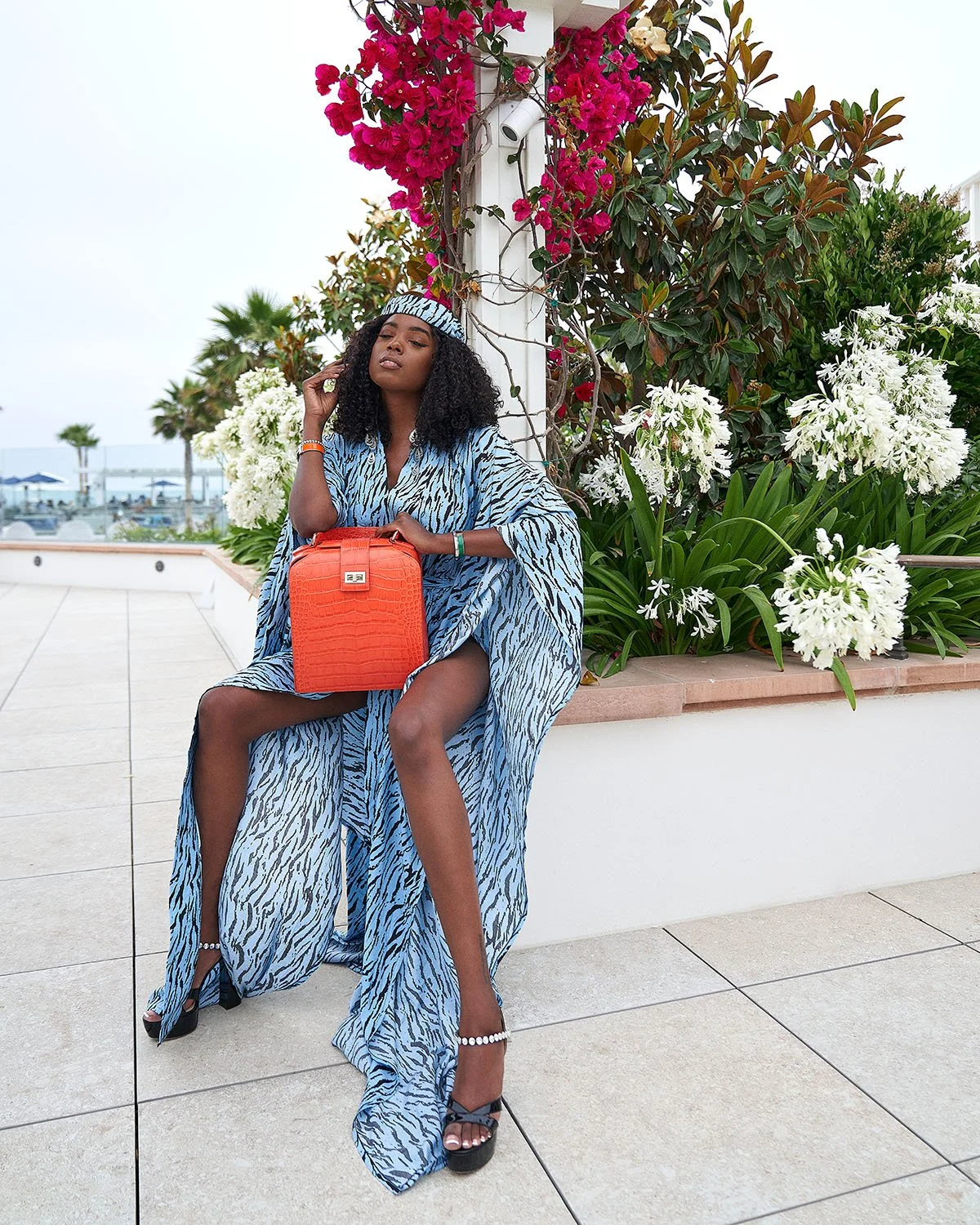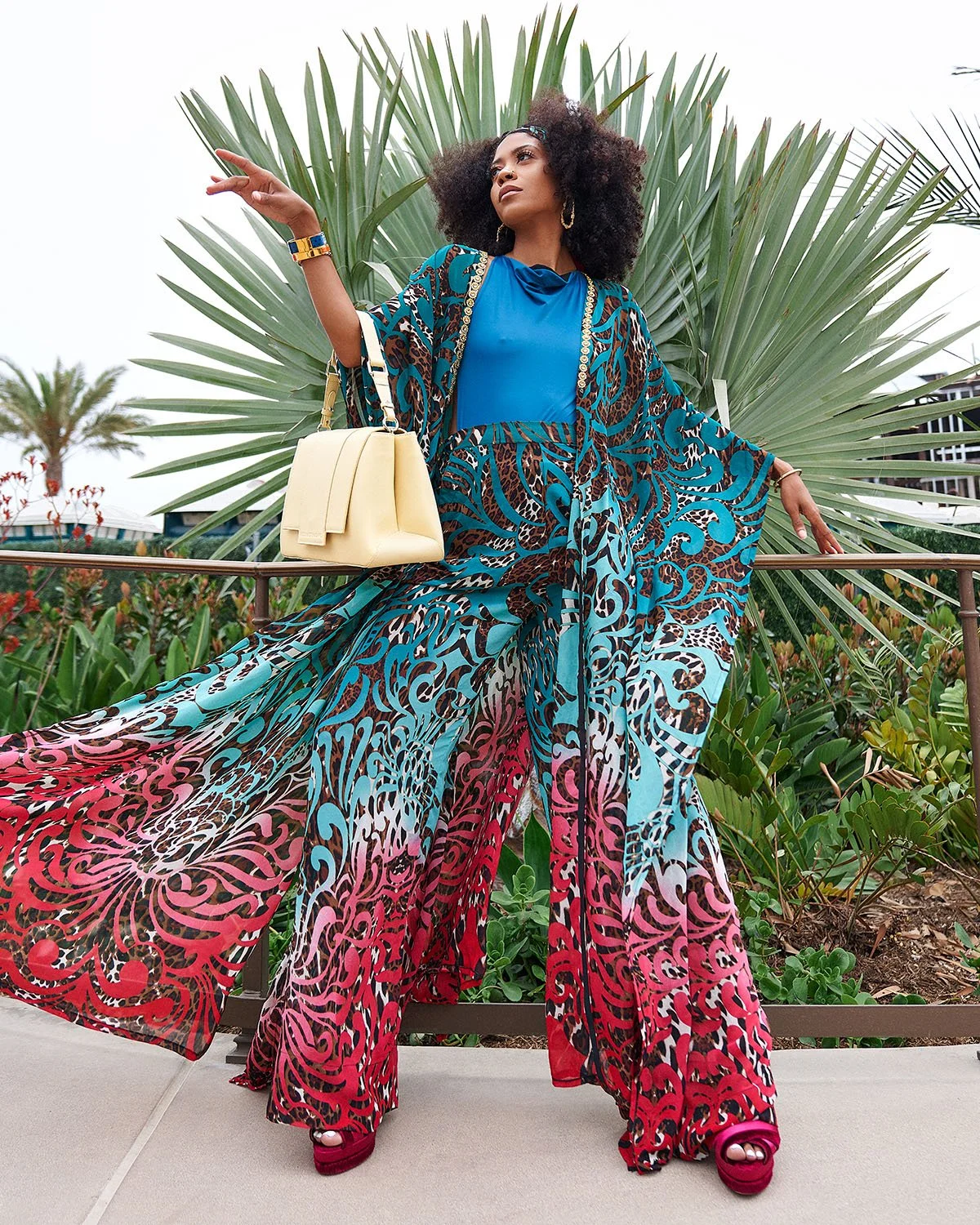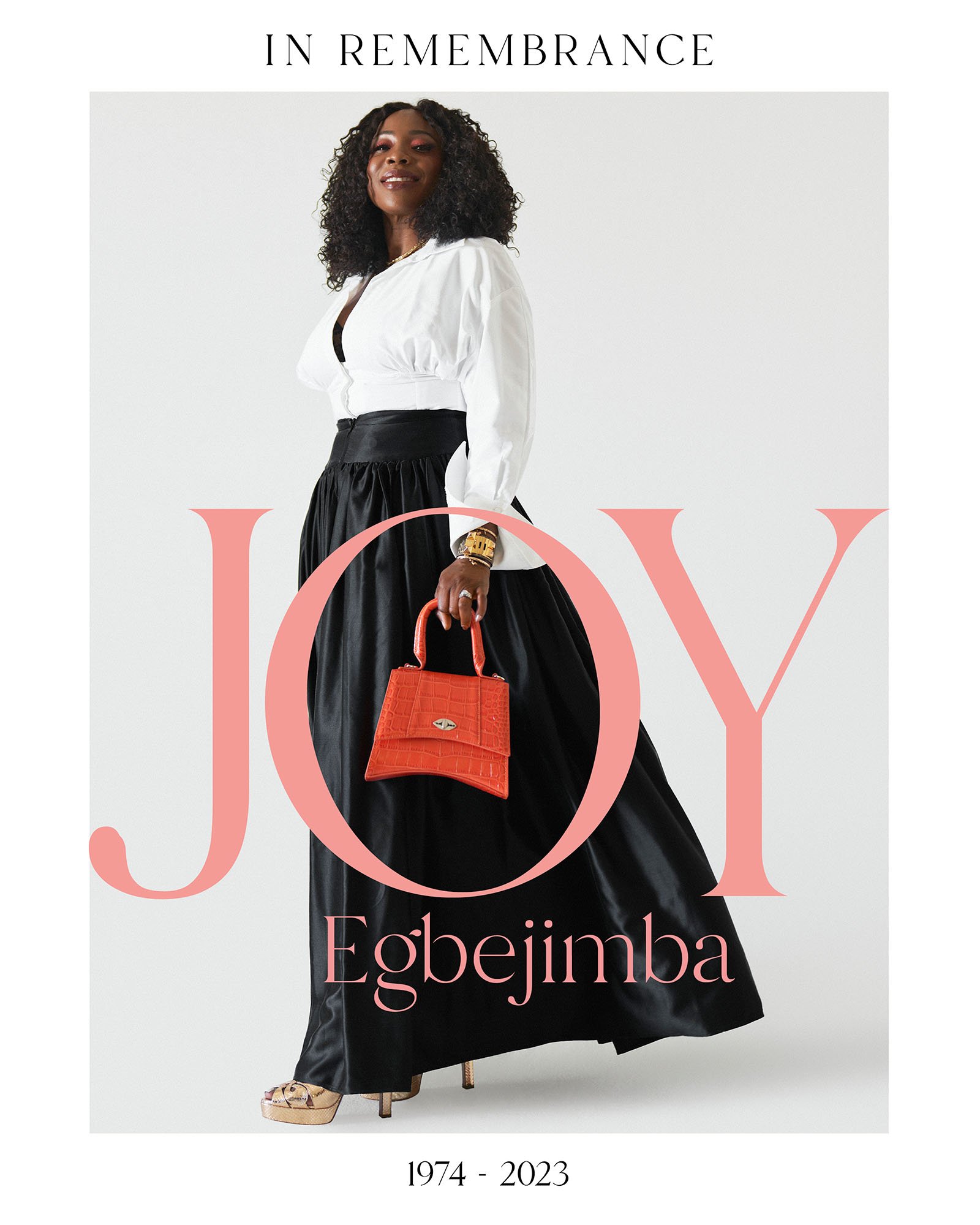
Joy Egbejimba is the founder and owner of Nuciano, an accessories label specializing in leather goods designed in Seattle and manufactured in Nigeria. Nuciano began with a signature handbag and has since evolved to include Swarovski clutches, purses, and other accessories. Designed with a philosophy of attainable luxury, Nuciano is quickly becoming an international brand in its own right.
Joy has been many things over the years—entrepreneur, businesswoman, model, fashion connoisseur, accountant, mother, in no particular order. But her origins as an accessories designer resemble that of so many others who sought to solve a unique problem at scale. For Joy, that problem was a lack of quality in consumer leather goods as well as a lack of price points between inexpensive and to-the-moon. Nuciano aims to exist between those two price extremes without compromising quality.
Nuciano’s business strategy is like many others in the Northwest. Collections are designed in Seattle. Materials are globally sourced and manufactured. Some inventory is imported into the United States for final construction, inspection, and sales. Remaining inventory is warehoused in Nigeria where it is sold throughout African markets. But if we stop there, we’re only scratching the surface of a deep and fulfilling story. Joy has taken every opportunity to create a company that designs global sustainability and accountability into every possible process. And the results are illuminating to say the least.
Note: Interviews with Joy took place between August 2020 and May 2021 and reflect the uncertainty surrounding the complete shutdown of the fashion industry in response to the COVID-19 pandemic.
Joy Egbejimba
BORN : Nigeria
EDUCATION : Business Leadership, Accounting
EXPERIENCE : Founder, Nuciano
LABELS : 1
COMPANIES : 1
FOCUS : Accessories, Fine Leather
STUDIO : No
LOCATION : Seattle, WASHINGTON
ONCE UPON A TIME IN NIGERIA
“I remember, as a young girl about 17 or 16, I had a Dior bag. My mom used to buy me those bags because there wasn’t anything better in between. But quality is something I’ve come to know and appreciate all my life because I know good things when I see them. So I knew there must be a lot of people in my country that would want good things and embrace them. I just needed the right way to penetrate into the country, and that’s exactly what we were able to achieve with this new collection.”
“When women buy something, we begin a relationship. I remember talking to a friend of mine who said she will always buy Lancôme. And I asked her why. And she said it was because when she was younger and when she and her girlfriends would go to the mall, Lancôme was the only brand that would let them try their samples. So they’d go home and save their money because they knew how good their products were.”
“I feel that a handbag speaks volumes. I really believe handbags complete an outfit and can be used across your entire wardrobe. Its utility is far more necessary because it carries a woman’s entire world with her. She can have everything she needs, and I see that as a very powerful statement."
Nuciano X Medlin handbag
Nuciano ULA handbag
Nuciano IJERA Swarovski CLUTCH
“I remember my grandmother would be working all day, and when she was ready to go out, she would put on a bandana and pick up a handbag and it was like she was a whole different person. You wouldn’t even know she was just making a meal in the kitchen. She was ready.”
Nuciano’s 2021 Medlin Collection marks their first collaboration with Nigerian stylist and entrepreneur Mimi Yina (called Medlin) which resulted in the creation of the Medlin, Aurelia, and Jemma handbags.
“Medlin is a power to be reckoned with. I designed the handbags here in Seattle, but I worked with Medlin because I feel that with most designers, the disconnect for us is that we design things based on what we think markets are looking for. But I feel that if you work with a stylist that is always busy, they will have an idea of what customers are actually looking for, which was my aim with my collaboration with Medlin.”
And the collaboration proved successful. In our first interview in August 2020, Nuciano had risen beyond expectations through a series of strategic decisions that streamlined their end-to-end operations. Looking over 2020’s performance, Joy came to a key discovery. At that time, no one could have predicted how right she was, or how events beyond anyone’s control would change both her business and outlook forever.
“Because of COVID-19, I’ve come to realize that I don’t need to be in any showrooms or be in any stores to get to my customers. When I would go through the stores, I’d have to price things in such a way that allows them to take a percentage of the sale. So if I have a product that costs $5 to produce, I would need to sell it for 3x to make a profit, but the retailers also want their cut. And if the retailers can’t sell the items, I’m stuck with the inventory. If they just wanted 30 percent, that would be more reasonable, but I would still have to price things so they’re out of reach for so many people. And then I would have all this inventory, paying for a warehouse, and encountering overhead costs that are detrimental to me as a small business.”
Nuciano Medlin Collection handbags featured in The Summer 2021 Issue.
GLOBAL PRESENCE
Since founding Nuciano in Seattle in 2013, Joy has expanded into both Nigerian and Ghanaian markets. The decision wasn’t easy, culminating in many hard calls along the way. But Joy, with the help of a tight network of passionate and accomplished professionals, finally realized her dream of creating an international fashion company positioned to compete with the likes of LVMH and Kering Group’s finest handbag offerings.
“If you look at our handbags, even with influences from the 1960s, 1980s, and 1990s, you’ll see that I love things that are very clean that you would be proud to broadcast to the world. So my goal is to bridge the gap between quality and price. The quality has to be great so that people can use their purses and bags year in and year out. And the price has to be something that anyone can afford. I still get emails from people who purchased their Nuciano handbags five and six years ago who keep saying how many compliments they’re still getting every time they go outside with their bag. And that means everything to me.”
“After launching our brand in Nigeria and Ghana, what’s interesting is that, here in the United States, everyone’s life path seems to be already laid out. At 18, you get into college. At 22, you’re out of college. At 23, you get a job. But in Nigeria, it’s actually 10 years behind. You will be 35 before some of these things start happening for you due to so much uncertainty."
"Sometimes a 4-year college takes 10 years to complete because there will be many strikes that last for months. It’s very hard on everyone there. So I’ve found that our target market in America is between 25-55, but in Nigeria it’s 35-65. But that’s only part of the story. I want the world to demand better from brand owners. We owe it as a responsibility to our customers to do better. You must be aware of where your money is going. Your money is also your voice. Everyone should have the ability to afford luxury.”
“You must be aware of where your money is going. Your money is also your voice.”

NIGERIAN FASHION
The state of African fashion is complex. The same can be said of fashion in Nigeria on a smaller scale, representing established international brands, local independent houses, and even gray markets selling designer knockoffs at scale. But common threads emerge, and perhaps most encouraging, we can clearly see a deep passion for art and artists as well as the status that a designer name can bestow upon its bearer.
Nigeria is one of the most densely populated countries with nearly 61% under the age of 24. It’s also an incredibly diverse nation with over 250 ethnic groups speaking over 500 languages. With a large population of young and newly affluent citizens turning to brand names for status and luxury experiences, there is no shortage of creativity and ingenuity—traits that can be reflected in the state of Nigerian fashion and throughout the continent of Africa as a whole. Joy reflects on her last visit to Nigeria in 2021:
“African fashion is absolutely growing. In the next 10-15 years, I believe it will be the next hub for fashion. When I went back home to Nigeria this last time, I saw that fashion was being pushed to all kinds of levels. There were so many people in the streets dressed like Billy Porter that really understood fashion, and I began to really understand why fashion is the way it is. They are pushing every boundary. Almost everything is unisex and I absolutely love that. It’s such a vibrant and creative place to be right now and I’m hoping to continue to engage with more creatives back home and here in the U.S. that see fashion the same way. It’s like what they say in Dubai—if you can dream it, you can build it. It’s something that’s so refreshing to see.”
Nigeria has already begun building the nation of their dreams. Juliet Anammah, Chairwoman of e-commerce giant Jumia, became the first head of an African startup to ring the ceremonial bell at the New York Stock Exchange after being listed (NYSE: JMIA) in 2019. But major roadblocks stand in the way of progress. Allegations of government corruption, lack of resources and financing, cultural appropriation, theft of intellectual property, and more threaten to prevent the fashion industry from experiencing the same level of progress seen in other sectors. Yet, no matter the difficulties, Joy remains undeterred.
“I think there was a kind of imported culture and even cultural appropriation that was really holding back the fashion industry in Nigeria, as well as elsewhere in Africa. There would be a designer that would create something incredible, and the next thing you know, a major brand would copy it and have it in their store. But now we have social media to call that out and let everyone know it’s not right. And we now have people like Naomi Campbell helping African designers to get credit for their designs, and Edward Enninful helping to shine light on both fashion and its darker side, so that when we can all bring our creativity and passions together, it will truly speak volumes. We will always get further together than we ever will by ourselves. The world is big enough. There’s enough to go around. We can do it together.”
Joy photographed in studio, June 2021.
A BETTER MOUSETRAP
“I remember not that long ago, I bought a belt for my son when he began the school year. It said it was ‘genuine leather’ and so I bought it. But less than a month later, it broke. So I took it back to Macy’s and asked them to explain this to me. They said that this was the only kind of leather that was currently on the market, and that the leather I was describing was no longer in existence. I couldn’t believe it. So I went home to look at all of my high end products made from excellent leather, and sure enough, they were all at least 15 years old. That was when I decided to make leather belts that are far better than what can be found on the market today.”
Innovation in business is necessary for success. A static system will quickly find itself irrelevant in a changing economy. For Joy, it became clear that in order to expand her business into new territories, she needed to position herself at the cutting edge of industry practices, which meant completely redesigning her supply chain.
“There’s an African proverb that my people say. Basically, an adult should not be in a barn when a goat that has given birth has died in childbirth. In other words, you cannot be someone who wants to make a change, or are in a position of power to make a better tomorrow, and keep quiet about the things you have seen. This is a conversation that the world needs to have. And even in myself I have had to change factories because of what I have seen and now think about.”
“I spoke with one project manager in China who said there were kids who haven’t seen the sky before. And I asked why. He told me to look up. And when I did, I only saw dark clouds. He said this was how it was year in and year out because of the pollution. Even on my first trip to China, we couldn’t land [our plane]. Instead, we had to divert to Hong Kong until the thick cloud cover lifted. When I asked the factory managers what they were doing to help fix this, they said they didn’t know. I asked them if they were willing to only run their heavy machinery from 2:00am to 4:30am to try and reduce the emissions. They thought about it, and sure enough, they began to implement it. And then I knew, if only all of us would stand up to the systems in place and the people we work with—trust me—we can make this world a better place. If we become educated, and go and see how the world really works, we can absolutely make this a better place.”
“You cannot be someone who wants to make a change. . . and keep quiet about the things you have seen.”
“Nowadays, our leather comes from Nigeria. I met with the Nigerian Minister of Science and Technology in Washington, D.C. and after he spoke, he asked me to come home and see what they were doing. And I can say that there’s a lot of improvement, so that was one of the reasons I chose to go home. And the more I thought about it, the more I saw that this could be a way to help create jobs back home as well as help me cut down on emissions and the cost overall, which would benefit consumers by lowering their final price. I could finally bring luxury to everybody. But the Nigerian leather industry hasn’t really progressed as much as we’d like. We don’t have some of the machines it takes to tan the leather to perfection. So I invited tanners from New York to come teach the tanners in Nigeria how to better their techniques, which helps everyone. So we do most of the work in Nigeria, then take the raw materials here to the United States and finish them.”
“I’m very particular about how I want the final product to look and feel. It takes a lot of research to get everything to that level where we will now consider it to be perfect. And I’m very concerned with sustainability. So when I speak to everyone—from the growers and tanners back home, to the tanners here in the U.S.—I say to them, remember that whatever we do, we have to leave room for our children. Whatever doesn’t need to be done, do not do it. Whatever we can do to reduce carbon emissions, do it. Because this planet is still our home. This is where we belong. And so we can invest in the farmers, growers, tanners, technicians, and ask them what can we do to help them be more successful, and because we’re cutting out so many middlemen, we can invest in their lives so they can grow more successful. And that’s my goal: To streamline the entire production so that everyone can really benefit. And I will say that the leather industry as a whole has really improved a long way in that direction. They’ve used new technologies to make things so much better than they were 20 years ago when things used so much energy, water, and other natural resources.”
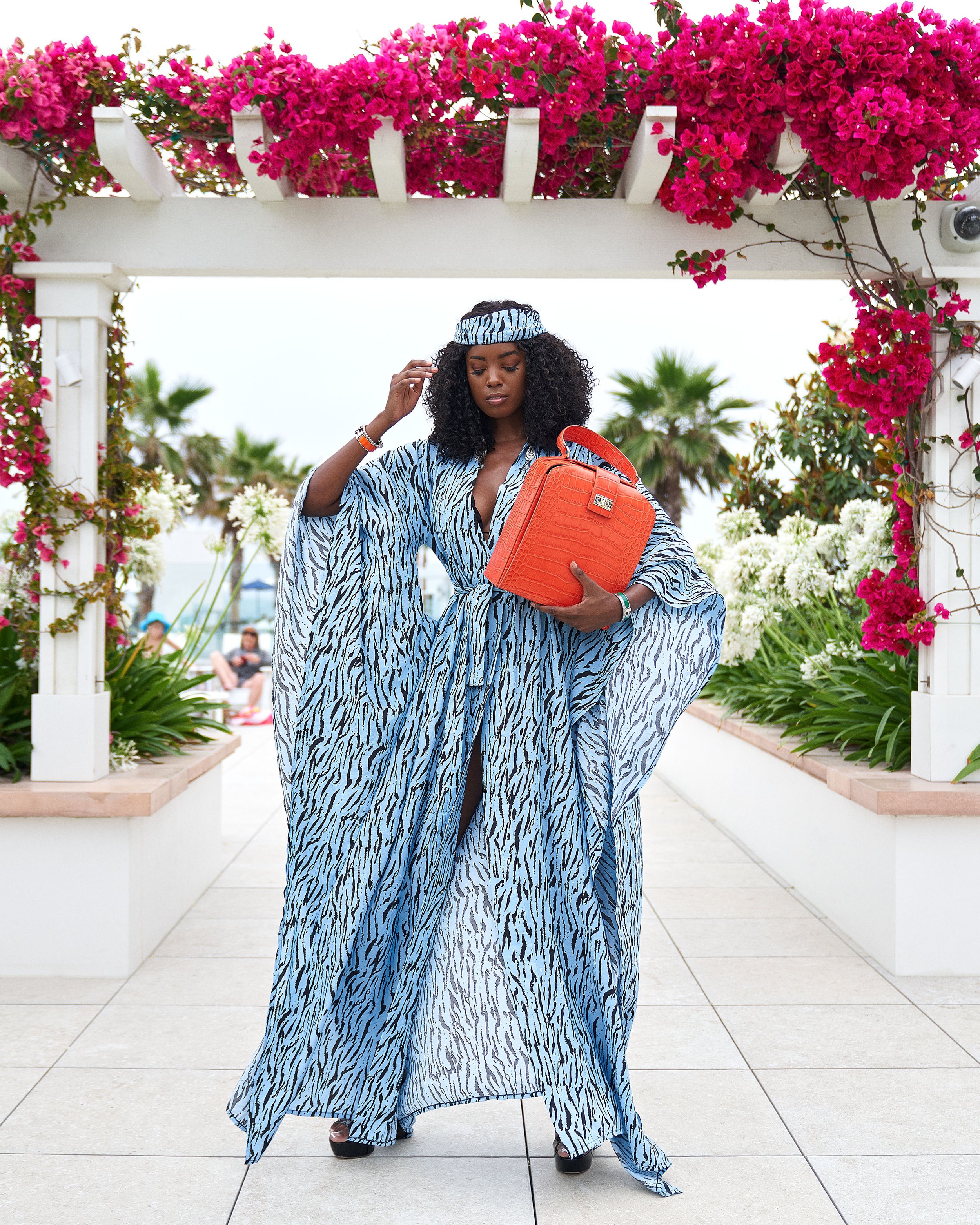
NUCIANO SCHOLARS
“Nuciano Scholars is one of the things I’ve always wanted to do to give back. I was very fortunate growing up in Nigeria as a girl in my family with a lot of brothers. I was seen as one of them, not treated differently. But for my girlfriends in their own home, it was different. When I was younger, our family would go to our country home during Christmas, and every year I would have to make new friends. They were all disappearing on me and I had no idea why. I learned much later that I lost one of my friends who died giving birth to a stillborn child when she was too young. All I can remember was my mom who looked so sad when we got back home, saying that could have been her little girl. And I asked her, what do you mean? And she said nothing. It was later I learned that so many of my young friends were being married off and I wouldn’t see them again.”
According to UNICEF at the time of writing, 1-in-5 of the world’s out-of-school children are in Nigeria, even though primary education is officially free and compulsory. From the UNICEF website: “Gender, like geography and poverty, is an important factor in the pattern of educational marginalization. States in the northeast and northwest have female primary net attendance rates of 47.7 percent and 47.3 percent, respectively, meaning that more than half of the girls are not in school. The education deprivation in northern Nigeria is driven by various factors, including economic barriers and socio-cultural norms and practices that discourage attendance in formal education, especially for girls.”
Among some of the sociocultural norms prevalent in parts of Africa include child marriage, polygamy, female genital mutilation, and the treatment of women as property. All of these contribute to a culture that prevents young women from gaining their education. And without education, it becomes nearly impossible to change. Joy continues:
“It’s so alarming. These little girls, they’ve been disfigured for the rest of their lives, they can have AIDS, all kinds of other diseases, physical malfunctions that require many surgeries to get them back to even a halfway point. It’s crazy when you explain these things to people—especially to those who’ve never traveled abroad—that you will never truly be educated until you travel and see what nobody can teach you. It will teach you things that you never knew existed. In another country, a woman can go missing and nobody would ever say anything. She is a commodity like cows or goats. One man can be married to up to 15 women and nobody can question that. And it becomes a cycle that just keeps going. Even well educated men that live in the States, when they retire, they go back to their villages and do the same things they saw their fathers and uncles do.”
“So my goal now is to try and bridge that gap and setup a fund for girls to be educated. In Nigeria now, education from 1-12 is free, but college is where the expenditure becomes a burden for families. So I’m going to help them get into college. This year, we have two girls on board and both of them are going into a nursing program. And I had a friend of mine call and say she wanted to sponsor a girl all the way by herself. I was just blown away. So I’m going to work with the schools myself to make sure the money goes directly to the school fees and books. I really believe that when you educate girls, you change the world. That is absolutely true.”
JOY PHOTOGRAPHED IN STUDIO, JUNE 2021.
“I really believe that when you educate girls, you change the world. That is absolutely true.”
#ENDSARS
Despite numerous setbacks resulting from the global pandemic, Nuciano had finally found their stride. Even after learning that some of her distribution partners and retailers had gone out of business, Joy was able to pivot to an e-commerce-first strategy. But in October 2020, the unthinkable happened.
Tensions in Nigeria had grown to a fever-pitch as reports of police brutality had gone viral on Instagram and Twitter. Images of young Nigerians allegedly beaten and shot in the streets ignited decades-long anti-police sentiment that spilled out into violent protests. Nigerians across the internet pleaded with celebrities to use their platforms to call attention to the injustice. And it worked. Many celebrities including Beyoncé, Rihanna, John Boyega, and even Twitter CEO Jack Dorsey helped spread news of the violence attributed to Nigeria’s Special Anti-Robbery Squad (SARS) to a world still reeling from a year of immense loss and injustice.
Back in Seattle, the year had already been tense, as the United States adopted many evolving policies and recommendations for small businesses during the outbreak of the coronavirus in the months prior. And the events surrounding the Black Lives Matter movement showed us all what many communities in the United States and throughout the world had been living with daily. But nothing could have prepared Joy for the experience of becoming swept up by a nation’s fury as the collateral damage in an ongoing struggle for an end to police brutality.
COLLATERAL DAMAGE
The front doors were forced open as shattered glass littered the floor. An air conditioning unit, ripped from the wall, now dangled from what remained of its electrical conduit. When the fires dimmed and the shouting ceased, all that remained were torn boxes and empty shelves as millions of Nigerian Niara worth of product had been stolen during the SARS protests, leaving Joy with little more than unanswered questions and what looked at the time like dreams dashed upon the rocks of an already torrential year.
“It’s something I don’t even want to think about right now,” Joy replied in a later interview. Though the violence had subsided, the aftermath of losing everything left a grief that sank like a heavy stone cast into a darkened ocean. Nuciano took to their Instagram account to comment:
Screenshot from video captured by Nuciano in the wake of #ENDSARS protests, October 2020.
“It breaks our hearts to announce that our Lagos warehouse has been vandalized and looted. Even though years of hard work and stock running into millions of Naira has been stolen from us, we acknowledge that this is only a setback compared to the lives lost in the course of the fight for better governance. Our thoughts and prayers remain with families who have lost loved ones and fellow Nigerians everywhere, we pray that we all find the strength to recover from our various losses.”
Joy followed with a personal message directly to her customers: “When I saw the amount of looting and destruction that happened in our Nigeria, Lagos warehouse, I was very discouraged. Especially going back to my home country to try to do this again. But due to the love and encouragement, messages, private messages, calls, from some of you encouraging us, asking us what can we do to help, it made me to change my mind. I want to do this again.”
Joy had launched Nuciano in Nigeria nearly three years earlier, a decision which resulted from years of research into African fashion markets as well as her commitment to maintaining high business standards. For Joy, this wasn’t about stolen or damaged property. This was about becoming a force of change in the nation of Nigeria as well as at home in Pacific Northwest.
“I know that, even though what I went through in Nigeria happened, I still believe that I need to be there. I know they will embrace the brand over there, and they did. Nuciano is the hottest thing there now. Women are saving money just to have a Nuciano bag. And it’s a good feeling to be recognized that way in your own country.”
“Everyone should have the ability to afford luxury.”
On May 9th, 2023, Joy Ifeoma Egbejimba passed away in the presence of the ones she loved. Whilst her time with us was short, her impact was great, both locally and internationally. Please see her official obituary for more details. And view a celebration of her life and impact on Seattle Fashion Collective by our founder here.





